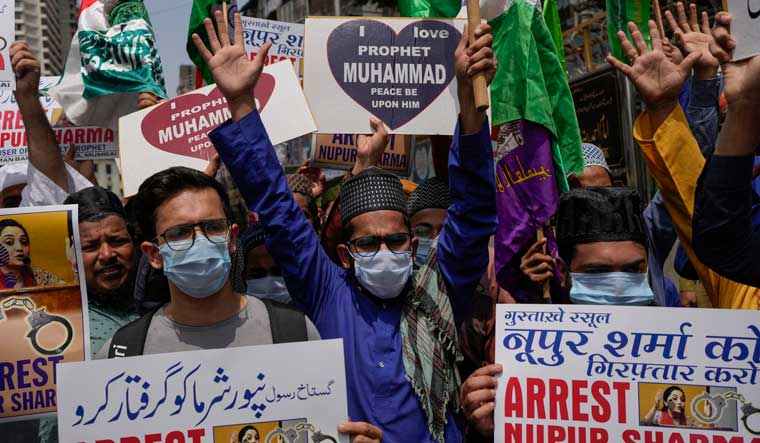The negative publicity could not have come at a worse time. The unsavoury remarks by BJP leaders regarding Islam and Prophet Muhammad might just undo all the painstaking effort that the Narendra Modi government has put into forging strong ties with the Islamic world.
Modi has wooed the Arab world with diligence over the past eight years, collecting an assortment of high civilian honours from these countries, including UAE, Saudi Arabia, Bahrain and Palestine. He has helmed important cooperation pacts, including the International Forum for Economic Cooperation, or the West Asia Quad, whose members are USA, Israel, UAE and India. More importantly, India has begun earnest attempts at trade pacts with this part of the world. The ink on the Free trade Agreement with the UAE has just about dried, and the buzz was that a similar treaty with the Gulf Cooperation Council (GCC) was in the works.
The developments now have the Islamic world lashing out at India. After Saudi Arabia, Iran and Qatar, even the Taliban-run Afghanistan has issued statements against India. Pakistan, not to lose a good chance, too, has lashed out with statements from both Prime minister Shehbaz Sharif and the ministry of foreign affairs. “The Islamic Emirate of Afghanistan strongly condemns the use of derogatory words against the Prophet of Islam (peace be upon him) by an official of the ruling party in India. We urge the Indian government not to allow such fanatics to insult the holy religion of Islam and provoke the feelings of the Muslims,'' stated a tweet by the Taliban government's spokesperson Zabihiullah Mujahid. Ironically, only a few days ago, Indian diplomats had reached out to the Taliban and visited several places in and around Kabul, which were built with Indian aid. Sharif tweeted that India under Modi was trampling religious freedoms and persecuting Muslims. The Organisation of Islamic Cooperation, too, has issued a statement against India.
As condemnatory statements begin coming thick and fast, India, too is changing its stance from the apologetic note of yesterday to an aggressive one today. Yesterday, when Qatar summoned the Indian envoy and cancelled a dinner with Vice President Venkaiah Naidu (though it gave a health excuse for it), the Indian government was in placatory mode, distancing itself from Nupur Sharma and Navin Jindal. India said that the comments did not reflect the views of the Indian government, but those of fringe elements. It said that strong action was already taken against the individuals and a statement issued by concerned quarters (read BJP) emphasising respect for all religions, denouncing insult to any religious personality or demeaning any religion or sect.
Today, India is on the defensive. It has responded to Pakistani comments with a rejoinder that says that the “absurdity of a serial violator of minority rights commenting on the treatment of minorities in another nation is not lost on anyone. The world has been witness to the systemic persecution of minorities including Hindus, Sikhs, Christians and Ahmadiyas by Pakistan.... We call on Pakistan to focus on the safety, security and well being of its own minority communities instead of engaging in alarmist propaganda and attempting to foment communal disharmony in India.'' Similarly, it has responded tartly to the OIC, calling its views “unwarranted and narrow minded'' and asked the OIC secretariat to “stop pursuing its communal approach and show due respect to all faiths and religions'' .
The government is keenly aware that while it can be sharp with some countries, it has to work out a delicate approach with others, that are important for India's foreign policy. Distancing itself from Sharma and Jindal has no impact. Sharma was national spokesperson of the BJP which is the ruling party. The damage is immense and will require a lot of backdoor and out of the box approaches to mitigate. A headache that the government could well do without.





